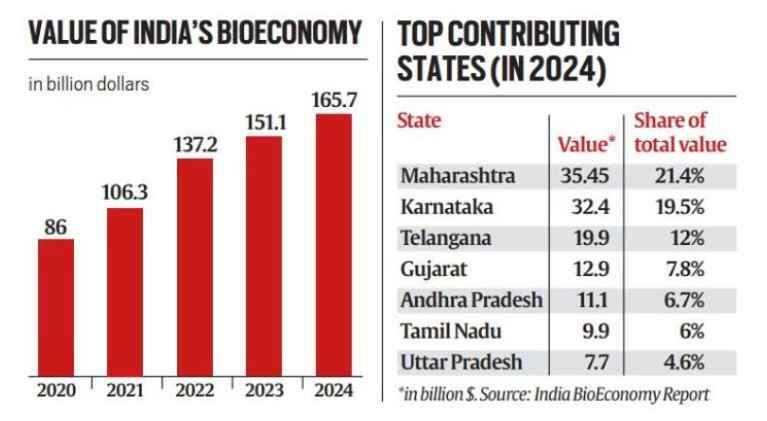



Copyright infringement not intended
Picture Courtesy: THE HINDU
Context
The biotech sector needs to overcome funding, infrastructure, and regulatory hurdles to achieve global leadership and scale innovation.
Biotechnology (biotech) is a high-growth, knowledge-based industry that uses living organisms, cells, or biological processes to create innovative products and technologies for human and environmental benefit, integrating biology, genetics, and engineering.
Examples
Biopharmaceuticals
Bio-Agriculture
Bio-Services
Bio-Industrial
Bio-IT
Market Size & Growth
Sector is rapidly growing, from 500 startups in 2018 to over 10,000 in 2025, supported by 94 incubators. This growth is driven by affordable R&D, a diverse talent pool, and digital integration. (Source: The Hindu)
Government aims for a $300 billion bioeconomy by 2030, with initiatives like the BioE3 Policy.
Global Leadership in Vaccines & Generics
India supplies over 60% of global vaccine doses and is a major provider of generics, known as the "Pharmacy of the World." The Oxford-AstraZeneca-SII collaboration during COVID-19 exemplified this.
Companies like Serum Institute of India and Bharat Biotech are global leaders in affordable vaccines, while MedGenome drives precision medicine breakthroughs.
Funding Challenges: Growth Stalled After Early-Stage Success
India’s biotech sector has witnessed a rise in early-stage startups, but struggles to secure growth and late-stage funding necessary for commercialization and scale-up.
Late-stage funding deficit
Low R&D expenditure
Infrastructure Inadequacies: Fragmented and Uneven
India has expanded its incubator network, yet infrastructure remains fragmented and unequally distributed across regions.
Fragmented facilities
Regional disparities
Ecosystem fragmentation

Talent and Workforce Gaps: Abundance without Specialization
India’s large human resource base is offset by a skills mismatch and brain drain in specialized biotech domains.
Skilled labor shortage
Brain drain
Regulatory and Policy Constraints: Complex and Outdated
India’s regulatory framework has not evolved fast enough to match the speed of biotech innovation.
Outdated frameworks
GM crop hesitation
BioE3 Policy & Vision 2030
The BioE3 Policy and an ambitious vision to create a $300 billion bioeconomy by 2030 provide a strategic roadmap and foster a conducive policy environment.
Startup India & BIRAC
The Startup India initiative, coupled with funding and mentorship from the Biotechnology Industry Research Assistance Council (BIRAC) (an industry-academia interface under DBT), supports early-stage biotech startups.
Production Linked Incentive (PLI) Schemes
PLI schemes for pharmaceuticals and medical devices incentivize domestic manufacturing, attracting Foreign Direct Investment (FDI). India permits 100% FDI in many biotech segments.
Bio-RIDE Scheme
Strategic thrust into biomanufacturing and biofoundry capabilities, aiming to establish India as a global hub for advanced biotech production.
National Biopharma Mission
Supports product development in biopharmaceuticals, including vaccines and biosimilars.
Consolidate and Deepen the Ecosystem
Instead of dispersing resources across many fragmented incubators, India needs to consolidate efforts into a few robust clusters.
Establish Good Manufacturing Practice (GMP) in biotech hubs, jointly funded by the government, multinationals, and development finance institutions, pooling downstream equipment and expert services.
Bridge the Financing Gap
Create a dedicated biotechnology fund. This fund could provide matching equity or venture debt for companies that have demonstrated proof-of-concept but are not yet market-ready for large-scale investment.
Utilize blended-finance structures to attract institutional capital from insurance companies and pension funds, offering partial guarantees to cushion scientific risks.
Streamline Product Development through Late-Phase Trial Hubs
Establish a network of specialty centers within All India Institute of Medical Sciences (AIIMS) hospitals. These centers would dedicate ward space, imaging suites, and integrated electronic-health-record (EHR) systems exclusively for industry-sponsored clinical trials.
Harmonize ethics committees and centralize laboratories to reduce trial delays, ensure data integrity, and reassure international regulators.
Address Talent Challenges through a Reverse Brain Drain Initiative
Implement policies like tax holidays, relocation grants, and soft loans to attract post-doctoral scientists and top AI talent back to India.
Develop micro-credential courses in critical niche areas (e.g., CRISPR process engineering, GMP data integrity, AI-driven biostatistics) to ensure the workforce remains competitive and future-ready.
India's biotech revolution must be inclusive, ethical, and globally competitive. The path forward requires leveraging existing strengths and addressing systemic weaknesses.
Global Biomanufacturing Hub
Build on India's vaccine success to become a world leader in biomanufacturing for a wide range of biologics and advanced therapies, with the Bio-RIDE scheme as a critical driver.
Precision Medicine "For All"
Develop affordable, India-specific precision medicine solutions that cater to the country's diverse genetic and disease profiles, making advanced healthcare accessible to the masses.
Green Bio-economy
Link bio-agriculture and bio-industrial applications to rural development, promoting climate-resilient GM crops, sustainable biofuels, and biomaterials.
Ethical Governance and Public Engagement
Establish robust ethical guidelines for emerging biotech (e.g., gene editing, AI in healthcare) and actively engage with the public to build trust and ensure responsible innovation.
Strategic International Collaboration
Pursue partnerships with global leaders for knowledge sharing, technology transfer, and co-development of solutions for global public good.
The Biotech sector is growing, driven by innovation, government support, and global demand, despite challenges in funding, infrastructure, and regulations. To lead globally, India must enhance biotech hubs, attract investment, update regulations, and develop skilled professionals.
Source: THE HINDU
|
PRACTICE QUESTION Q. India’s biotechnology sector is thriving in innovation but struggling in scale. Analyze the key structural bottlenecks hindering the sector's transition into a global biomanufacturing hub. 250 words |
The Bio-NEST (Bioincubators Nurturing Entrepreneurship for Scaling Technologies) initiative supports the establishment of bio-incubators across India. These facilities provide necessary infrastructure, equipment, and mentoring to biotech startups and early-stage companies, helping to foster innovation and accelerate product development.
The BioE3 (Biotechnology for Economy, Environment, and Employment) policy, approved in 2024, is India's first policy for promoting high-performance biomanufacturing. It promotes a circular bioeconomy and aligns with India's green growth and net-zero carbon goals by focusing on sustainable production and bio-based products.
The Biotechnology Research Innovation and Entrepreneurship Development (Bio-RIDE) scheme is a major initiative by the Department of Biotechnology (DBT) that merges and expands upon several previous programs. Approved in September 2024, it aims to accelerate research, promote bio-entrepreneurship, and strengthen India's biomanufacturing capabilities.
© 2026 iasgyan. All right reserved